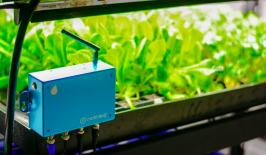If there’s one future we can bet on, it’s robots helping us with agriculture. The next crop of farmers are set to be robots seeding, weeding, and feeding the plants that sustain us – and the next billion people.
The UN’s 2015 study conducted by the UN Population Division estimated a world population of 8.5 billion humans by 2030, and 9.8 billion by 2050. Agriculture will need to continue to supply hungry mouths as the population grows.
Eliminating problematic plants that reduce crop yields and compromise harvests has been a problem since time immemorial. Herbicides are effective, but some chemical weedkillers have consequences for the environment and for humans that we are only just starting to comprehend.
We previously covered smart robots using machine learning to conserve 20 times less herbicides, through image recognition and pinpoint accurate spraying on weeds.
But what about no herbicides at all?
The concept and theory of electric weed control dates back as far as the 1800s, but electricide has portability and control demands that haven’t been yet been solved at scale.
British agtech startup RootWave is hoping to change that. The company has technology to apply high voltages to effectively electrocute plants, completely killing the plant to the root, from the inside out. Applying the right voltage serves to boil the water and cells inside plants.
The technology started as a simple hand-weeder, used in English parks and gardens, with 1.3 million euros of EU funding helping scale up the project to an automated agricultural solution. In line with increasing restrictions on pesticides in the EU, RootWave offers a hand-held and portable solution, as well as a product designed to work with tractors.
The system takes power from the tractor’s power take-off shaft (PTO), to an alternator, and into a proprietary solution to jolt the right output into the weed, zapping it dead without disturbing the soil. A pull-behind unit is expected in 2020, and should cover between eight to 12 crop rows, using cameras and visual recognition to identify weeds in real time and on the go, with a speed of around 4.8km/hr (3mph).
The system, for now, treats only smaller weeds, with an implementation for larger, mature weeds in the pipeline.
What about costs? Andrew Diprose, CEO of RootWave, told AgProfessional “[it] will start as cost-comparable with herbicides, but in time, the potential is strong for a lower than chemical cost. There are basically no inputs other than capital depreciation.”
RootWave is currently seeking investors to support advancing its technology.






